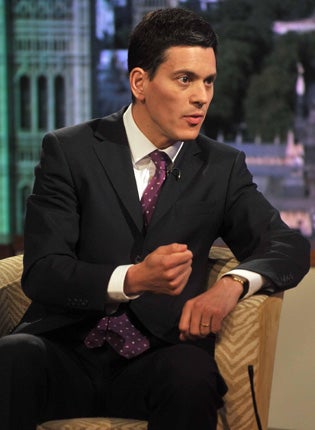Miliband defends 'patriotic' embassy worker facing jail
Iranian employed as political analyst denied access to his lawyer

After days in captivity, the release of one of the British embassy's staff members arrested in Iran was thought to be imminent last night. But the second Iranian employee being held is said to have been charged with the offence of "acting against national security", a charge which could result in a long prison sentence.
Reports yesterday also said that a British-Greek journalist who had been in custody for more than two weeks had been freed. The spokesman for the Iranian foreign ministry, Hasan Qashavi, claimed that Iason Athanasiadis, who has worked for British and American publications, had arrived in the country in the past on a British passport and had been expelled for "violating the law". He had returned on another passport, believed to be Greek, and had been detained for "illegal activities and behaviour violating the profession of reporting".
In Tehran, a lawyer, Abdolsamad Khorrashahi, said that Hossein Rassam, the chief political analyst at the British embassy who remains in captivity, has been charged but he has not been allowed access to his client. Ahmad Jannati, the head of Iran's supreme legislative body, the Guardian Council, has said: "The British embassy had a presence and some people were arrested. Well, inevitably they will be put on trial; they have made confessions too."
In London, the Foreign Secretary David Miliband again condemned the actions of the Tehran regime, described Mr Rassam as "an honourable patriotic Iranian who had been working in a completely open and transparent way for the UK". He added: "The allegations of improper conduct have absolutely no basis. I think it is very, very important we send a clear message that we are confident about the way he has been doing his job and that we are clear about our goal, which is his release, unharmed."
Mr Miliband said that there was better news for the other captive, disclosing that the British ambassador "was told by the deputy foreign minister[of Iran] that the eighth person would be released, that the papers had been signed, that there would not be a court process or charges".
There were more signs of tensions rising within the Iranian establishment yesterday, with the main group of religious leaders saying that the disputed election of Mahmoud Ahmadinejad was illegitimate. The Association of Researchers and Teachers of Qom asked in a statement: "Is it possible to consider the results of the election as legitimate by merely the validation of the Guardian Council?"
Using an emotive comparison between the protesters killed in the post-election disturbances and those who died in the 10-year war with Iraq, the Association criticised the government for refusing to address the issue of voter fraud and asked the clerics to save "the dignity that was earned with the blood of tens of thousands of martyrs".
The Association, which did not give its support to any of the candidates in the election, posted the statement on its website. It was subsequently picked up by many other sites.
"This crack in the clerical establishment, and the fact they are siding with the people and Mousavi, in my view is the most historic crack in the 30 years of the Islamic Republic," Abbas Milani, director of the Iranian Studies Programme at Stanford University in California, told The New York Times.
In Washington, the American Vice President Joe Biden said the US will not stand in the way of Israel if it decided to take military action against Iran. "Israel can determine for itself – it's a sovereign nation – what's in their interest and what they decide to do relative to Iran and anyone else," Mr Biden said in a television interview.
"Whether we agree or not, they're entitled to do that," he told ABC television's This Week. "Any sovereign nation is entitled to do that. But there is no pressure from any nation that's going to alter our behaviour as to how to proceed. If the Netanyahu government decides to take a course of action different than the one being pursued now, that is their sovereign right to do that. That is not our choice."
Join our commenting forum
Join thought-provoking conversations, follow other Independent readers and see their replies
Comments
Bookmark popover
Removed from bookmarks